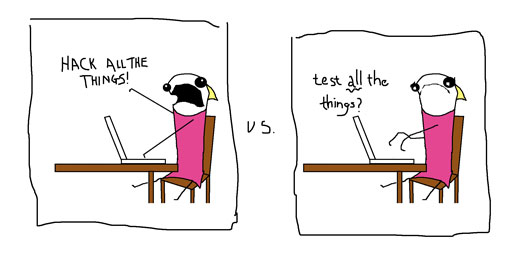This blog post is around seven or eight years overdue. Anyway, I had been musing about energy grids at the time and thinking about things like long-distance alternating current (AC) power transmission, the rise of solar panels, and electronics. I figured in 15-20 years (so about 7-12 years from now), we’d start seeing direct current (DC) power being more available from the wall. Before that can happen, people need a supply of DC power and devices that use DC power.
The Proprietary Ties that Bind: Part I — Instagram, not the last straw
In yesterday’s New York Times, there was an article about people getting angry over changes to Instagram’s privacy policies under Facebook rule. Rebecca Lieb of the Altimeter Group was quoted as saying
There are always Facebook users who say ‘This is the last straw,’ [but] there’s not a lot of portability. Where would you go?”
Continue reading “The Proprietary Ties that Bind: Part I — Instagram, not the last straw”
Testing is sexy

Writing a slick iPhone app is exciting. Building a communication tool that changes how people communicate is stimulating. Hacking ((cracking)) into a bank’s security system to pull of a heist is the stuff of Hollywood. “Liberating” information from classified sources can lead one to be hailed a hero. Writing test cases for code is sexy. Wait… what?
Continue reading “Testing is sexy”
Star Light, Star Bright
Star light, star bright,
The first start I see tonight;
I wish I may, I wish I might…
Hey, that’s no star…
It’s a satellite!
Looking up into space as a kid was so much simpler. Camping in the woods is no escape.
The War on Toronto
I’ve been following the current hearing about Mayor Ford and his alleged run-in with the Municipal Conflict of Interest Act (MCIA). Over lunch, I explained to Daniel Levy, one of Steve’s new students, the gist of what is happening. Daniel, hailing most recently from Winnipeg ((Daniel had his bike stolen the week after he arrived and now he gets to hear about our mayor. Welcome to Toronto!)), rightly wondered if the Mayor’s oafishness is due to cherry-picked quotes from the media. Continue reading “The War on Toronto”
Improving by leaps and bionic bounds
One of the most interesting pieces I’ve read all week is about how people that would have been considered “disabled” a century ago are receiving prosthetics of all sorts that are closing or have closed the gap with “normal” individuals. The thing that struck me most was Wilson’s comment that it was not the rich that will benefit at first from physical and mental enhancements but those perceived to be at a disadvantage. This provided some reassurance that the world of Harrison Bergeron will probably not come to be — at least not in terms of handicapping. In that future, all individuals are equal by bringing those that are (more) gifted in some way to the level of the least through a system of handicaps. In a world full of prosthetics such as those mentioned in Wilson’s article, maybe there can be equality for all not by diminishing our abilities but by amplifying them.
An almost-blog post
A few months ago, Steve suggested I write a paper for a particular conference. He even gave me a topic. Brat that I am, I thought about for a few minutes and then flat out said no to that topic but thought of another one suitable for the conference. I decided to write on the ethics and legality of reCAPTCHA. While outside the scope of my academic oeuvre, I figured that even if my paper got rejected, it would still make for an interesting “Random musings” blog post. But it hasn’t come to that. Instead, you can look for it at PST 2012 in a couple of months. At seven pages (and possibly eight after further additions), this is longer than my typical blog post. You might want to get your favourite hot beverage ready before diving in.
The crabs I have to put up with
On Tuesday, while at the end of my office hours at UT Scarborough campus, I noticed the computer lab workstations I was using had some educational software for biology installed. I fired up the unit on Darwinian evolution. This involved a simulator depicting snails with different shell thicknesses and crabs.
Continue reading “The crabs I have to put up with”
Encyclopaedia Britannica goes out of print
I was going to write a supportive blog about Quebec’s resistance against the crime bill that the government has tried to ram down the province’s gullets, but I’m afraid of being put on some terrorist watch list along with the environmentalists and being tracked down by Mr. Toews. Instead, I will write about an equally timely (if more mundane) topic…
Encyclopædia Britannica is going out of print and will soon be available only in its on-line version. I haven’t even seriously thought about print encylopædias since the late 1990s and the last time I used one was around 2002. While they may become collectible items a few years down the line from now, I certainly won’t miss them.
Continue reading “Encyclopaedia Britannica goes out of print”
Unreadable file formats and bit rot: Novel problems in the digital age… or not?
If you’ve been using computers for long enough, you’ve probably faced unreadable file formats or changes in distribution media: How do I open this old WordPerfect document? How am I going to read those files stored on a ZIP disk? Photographic prints and print editions of books have much less demanding requirements for seeing their contents. You found a box of slides from the 1960s? No problem; just hold them up to a light. In fact, if you have a good slide scanner or projector, despite their age, the pictures might still be of higher quality than images produced by your compact digital camera! The problems of unreadable file formats and changes in physical media are unique to the digital age. Or so some might have you believe (especially those pushing cloud services).
Continue reading “Unreadable file formats and bit rot: Novel problems in the digital age… or not?”
